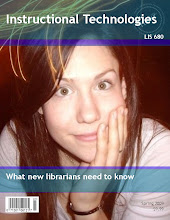danah doyd’s Viewing American class divisions through Facebook and MySpace struck a chord with me in that it mentions the fact that academia—or the parameters it imposes—can be limiting, revealing the value of freer forums like blogs and social networking sites and YouTube.
Here, in particular: “For the academics reading this, I want to highlight that this is not an academic article. It is not trying to be. It is based on my observations in the field, but I'm not trying to situate or theorize what is going on. I've chosen terms meant to convey impressions, but I know that they are not precise uses of these terms. Hopefully, one day, I can get the words together to actually write an academic article about this topic, but I felt as though this is too important of an issue to sit on while I find the words.”
I like that people can sort out what they’re trying to say, and get feedback on it, as soon as they have something to say.
I generally prefer to read people’s observation-based assertions, in part because they strike me as more genuine those based upon statistics (which I cannot help but question). There is definitely value in theories based upon soundly collected data, but nothing is more compelling to me than personal accounts that illustrate (or start!) a larger trend (not to mention a discussion). There’s something to be said for the fact that reputation, readability, and relevance can make a blog oor site or forum popular (as opposed to knowing the right people in order to be published by the right entity), and that seems like such a pure democratic process.
On YouTube...
About this: “While [the] idealization of YouTube as a self-organizing, radically democratic community for sharing clip culture certainly helped to buffer what could be considered an act of selling “the community” as property to a corporate giant, the image of YouTube as a revolutionary alternative to corporate media culture has been a powerful one” (The YouTube Community). This “loss of an idealized space outside the global totality of commercial culture" (from John McMurria, quoted by Henry Jenkins in Taking the You Out of YouTube?) made me wonder about where our responsibility lies as far as being aware of—or assuring—that social networking sites be ‘socially responsible’ or ‘free’ or ‘ad free.’ My feelings on this are difficult to articulate (I’ll work on it), but it ties into my concern that Apple has set products up so well that we rely on them, however limited their lifespan (my shiny computer looks too beautiful to be outdated after just 4.5 years!!) and continue to pay big bucks for them. I wonder if people would still use YouTube if they had to pay a fee for it. I wonder if individuals will ever be generous and organized enough to beat out corporate giants. Or will we ever want to?
The phrases “radically democratic” and “profoundly democratic” fascinate me and have me wondering what the actual definition of plaine old “democratic” is! When I looked up the term in Wikipedia, I was redirected to the entry for Democracy. I did, however find a link to “Non-democratic democracies” which explains, “Moreover, in many countries, democratic participation is less than 50% at times, which makes them democracies only in name.” Could “radical democracy” have anything to do with the amount of participation, or am I leaping here? It’s interesting to note that Alex Juhasz describes YouTube as “relatively democratic.”
Another note about Boyd: She also asserts that “Americans aren't so good at talking about class,” and I feel her on that one. Never in my life has class been so immediately relevant to me, to my daily conversations and ruminations, as now, teaching in a New York City public school, and I often have the distinct feeling that I lack the vocabulary to discuss essential class issues. Interestingly, sometimes I feel suffocated by the need for political correctness (particularly in the context of student-related communications), and sometimes I feel offended by others’ lack thereof. Whether I have a set of standards that I can’t fully articulate, or whether my sensitivity depends on my mood, I can’t say. I’ll try to pay closer attention, and to connect the dots to see if there’s an identifiable pattern.
I like that class issues and moral debates are being explored online, in myriad formats and forums. I like that I can choose my sources, and that I can respond at will, and that how and why I (we!) do so is being talked about.
Sunday, April 26, 2009
Subscribe to:
Post Comments (Atom)

No comments:
Post a Comment